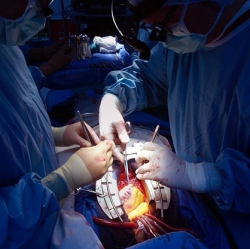
Researchers at Imperial College London have begun the first UK clinical trials of a gene therapy for heart failure. Heart failure, when the heart is unable to pump blood adequately, affects more than 750,000 people in the UK, causing breathlessness and hindering day-to-day activities.
The therapy is designed to increase the levels of SERCA2a protein in heart muscle cells by using a harmless virus to insert extra genes into the cells.
They have identified SERCA2a as an important factor affecting how well heart muscle cells can contract in people with heart failure.
“Our goal is to fight back against heart failure by targeting and reversing some of the critical molecular changes arising in the heart when it fails.”
The trials are the next step in the research after laboratory studies found that the gene therapy can be used to effectively restore function to the failing heart, in collaboration with colleagues from the United States.
Doctors plan to study the gene therapy in two separate clinical trials. The first, called CUPID2, will begin treating people with heart failure in the next few weeks in the Cardiovascular Biomedical Research Unit at the Royal Brompton Hospital.
CUPID2 will assess whether cardiac gene therapy to increase SERCA2a is safe and can improve both quality and length of life, and reduce emergency hospital admissions, for heart failure patients. The trial will involve 200 patients with heart failure from the Royal Brompton Hospital and other centres across the world, and is funded by US biotech company Celladon.
The second trial, called SERCA-LVAD, is due to start recruitment in the summer of 2013. Co-funded by the BHF, this trial will test the SERCA2a gene therapy in 24 UK heart failure patients already fitted with mechanical heart pumps, known as left ventricular assist devices (LVADs). It will give vital information about the effectiveness of the therapy by measuring the amount of the SERCA2a gene and protein that has been introduced into heart muscle.
